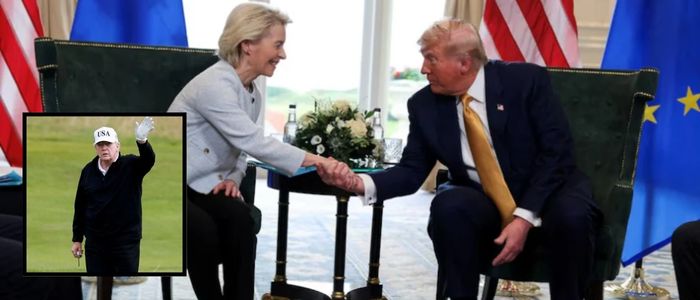TESTY AFTER HOURS — High-level talks in Scotland between President Donald Trump and European Commission President Ursula von der Leyen did result in both sides pledging not to slap a 15 percent tariff on the EU's exports to the U.S. That compares well with the 30% tax on imports Trump had previously threatened.
President Trump said that the E.U. would for the first time accept zero tariffs on some American products. The deal, von der Leyen said, is a stabilizing measure for both economies, which combine to account for almost a third of global trade.
Trump has leaned hard on tariffs with several countries, the UK, Japan, Indonesia, Philippines, Vietnam, attempting to remedy the global trade balance while cutting the US trade deficit. The deal is a major accomplishment in that effort, though his ambitious "90 deals in 90 days" pledge has yet to materialize.
Terms of the Agreement and Economic Impact
The new deals, brokered during Trump's visit to his Turnberry golf resort in South Ayrshire, also covered a pledge from the EU to boost investments in the US by $600bn, with a focus on the military sector. And it calls for investing $750 billion over three years in American sources of energy, including liquified natural gas, oil, and nuclear fuels.
This, said von der Leyen, will also contribute to weaning Europe off Russian energy.
It will have zero tariffs for some goods, such as aircraft and their components, certain chemicals, and a slew of agricultural products. A second deal with regard to semiconductors is anticipated to be announced imminently. But the US will keep its current 50% tariffs on global steel and aluminium imports.
Von der Leyen conceded that Trump had taken a direct interest in the talks, and referred to him as a "tough negotiator" and a "dealmaker.
Trump, for his part, said the agreement would draw the two sides near and put US$90 billion in tariffs into his pocket based on the previous year's trading relationship.
The EU previously raised the alarm about the potential consequences of punitive tariffs. With the US about to proceed with the 30% rate anyway, everything from French cheese and Spanish pharmaceuticals to German electronics and Italian leather would have been hit.
In response, the EU had been ready to impose tariffs on American goods like beef, car parts, and Boeing aircraft.
Mixed Reactions Across Europe
Benjamin Haddad, French minister for European affairs, said the agreement was a short-term reprieve from escalating tariffs but fails to redress the imbalance.
He stressed the advantages for French industries like spirits, but expressed concern at the fairness of the deal.
Irish Prime Minister Micheál Martin said that while they had avoided a higher tariff, trade would be "more expensive and more difficult." Ireland is especially exposed, being the EU member most reliant on trading with the US.
"To maintain a relationship with unpredictable trade flows, this would have been damaging for Germany," said German Chancellor Friedrich Merz, noting that the trade relations had to remain safe. Italian Prime Minister Giorgia Meloni said cautiously that she welcomed the agreement, but was "waiting for the final details."
Trump has hailed it as the biggest trade deal in history. The EU somehow succeeded in not having the worst outcome, but it has no clue how much actual value it will be getting from its deal. Von der Leyen's phrasing, then, and her talk of "rebalancing" the relationship on trade could be precise politics to move in tandem with Trump on the deal.
At the same time, Labour leader, Keir Starmer, will be meeting Trump at Turnberry, and on Tuesday, the US President will take his family to open a third golf course in Aberdeen.
The E.U. and U.S. had around $976 billion in trade in goods last year, with the U.S. importing about $606 billion from the E.U. and exporting $370 billion. Trump has called this trade gap a sure indication that the US is "losing" under the current status quo.
World

EU and US Reach New Trade Deal with 15% Tariffs

The European Union signed a new trade agreement with the United States on Friday, ending months of uncertainty on both sides of the Atlantic about the future of one of the world's largest trade relationships.















